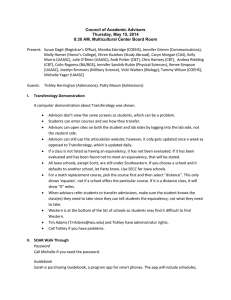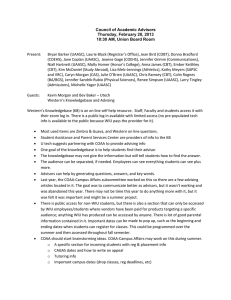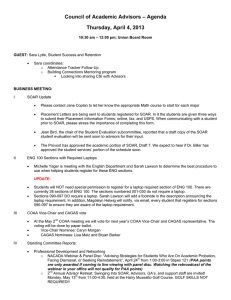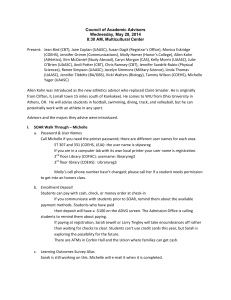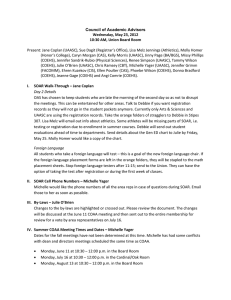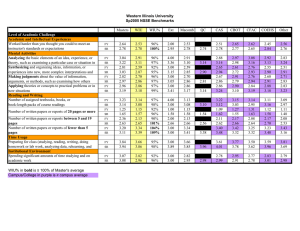Council of Academic Advisors Wednesday, April 18, 2012
advertisement
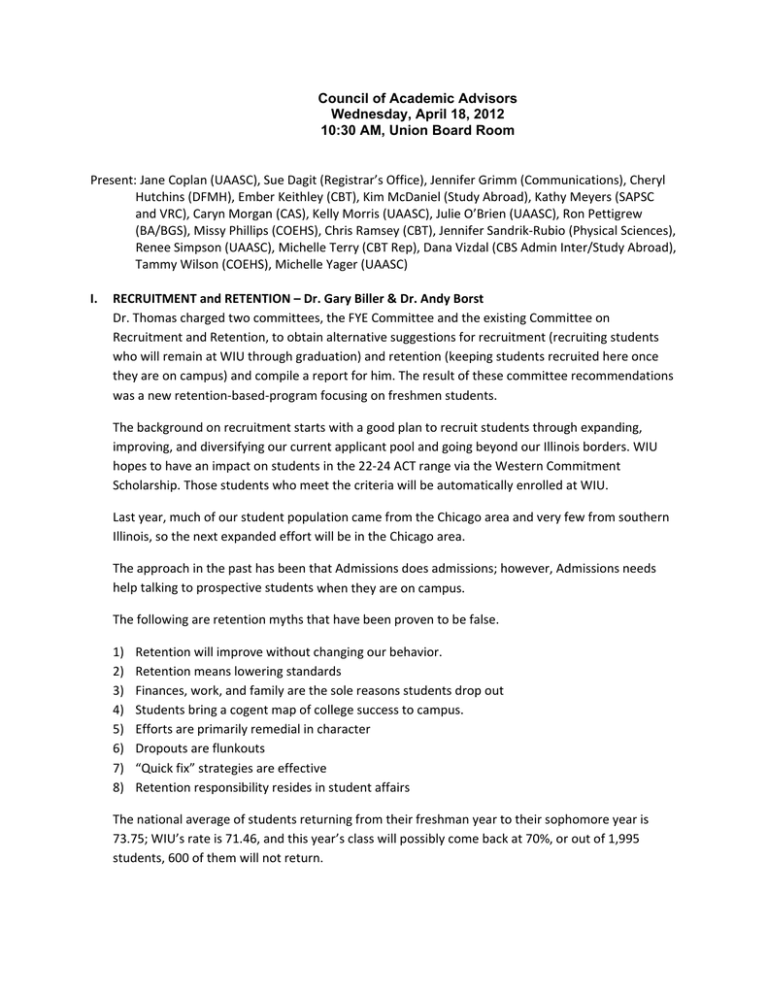
Council of Academic Advisors Wednesday, April 18, 2012 10:30 AM, Union Board Room Present: Jane Coplan (UAASC), Sue Dagit (Registrar’s Office), Jennifer Grimm (Communications), Cheryl Hutchins (DFMH), Ember Keithley (CBT), Kim McDaniel (Study Abroad), Kathy Meyers (SAPSC and VRC), Caryn Morgan (CAS), Kelly Morris (UAASC), Julie O’Brien (UAASC), Ron Pettigrew (BA/BGS), Missy Phillips (COEHS), Chris Ramsey (CBT), Jennifer Sandrik‐Rubio (Physical Sciences), Renee Simpson (UAASC), Michelle Terry (CBT Rep), Dana Vizdal (CBS Admin Inter/Study Abroad), Tammy Wilson (COEHS), Michelle Yager (UAASC) I. RECRUITMENT and RETENTION – Dr. Gary Biller & Dr. Andy Borst Dr. Thomas charged two committees, the FYE Committee and the existing Committee on Recruitment and Retention, to obtain alternative suggestions for recruitment (recruiting students who will remain at WIU through graduation) and retention (keeping students recruited here once they are on campus) and compile a report for him. The result of these committee recommendations was a new retention‐based‐program focusing on freshmen students. The background on recruitment starts with a good plan to recruit students through expanding, improving, and diversifying our current applicant pool and going beyond our Illinois borders. WIU hopes to have an impact on students in the 22‐24 ACT range via the Western Commitment Scholarship. Those students who meet the criteria will be automatically enrolled at WIU. Last year, much of our student population came from the Chicago area and very few from southern Illinois, so the next expanded effort will be in the Chicago area. The approach in the past has been that Admissions does admissions; however, Admissions needs help talking to prospective students when they are on campus. The following are retention myths that have been proven to be false. 1) 2) 3) 4) 5) 6) 7) 8) Retention will improve without changing our behavior. Retention means lowering standards Finances, work, and family are the sole reasons students drop out Students bring a cogent map of college success to campus. Efforts are primarily remedial in character Dropouts are flunkouts “Quick fix” strategies are effective Retention responsibility resides in student affairs The national average of students returning from their freshman year to their sophomore year is 73.75; WIU’s rate is 71.46, and this year’s class will possibly come back at 70%, or out of 1,995 students, 600 of them will not return. First‐year students need an intervention plan where intrusive, proactive strategies are used to reach freshmen, and faculty and staff play a huge role in this. The committee is looking at having freshmen complete the College Student Inventory CSI) before coming to SOAR and in that way building a mentoring relationship with volunteer faculty and staff. This partnership would take place within the first six weeks of the semester with a 30‐45 minute session where volunteers go over the CSI with their students. Students would complete the online inventory before SOAR but would not have access to it until they see their mentor. It is hoped that 200 volunteers can be recruited which, for a 2,000 student body, would be a 2:1 ratio. Volunteer mentors would have access to: a 60‐90 minute training session an online resource guide contact information for further recommendations a copy of the report for each of your students (the 100‐item survey which goes through academic motivation, general coping, and receptivity to support services). Every student will get specific recommendations, which will coincide with the online resource guide. The survey instrument was tested this fall with freshmen in Tanner Hall, with ½ completing MAP (the current freshmen survey) and the other half completing the CSI (which were then split into ½ seeing a mentor and the other half having no mentor). The CSI student group with a mentor had a higher return rate. If you are involved with another organization who would like information about this program, please let Dr. Biller know and he will send you information about volunteering. There are 2,000+ students targeted for this fall, and the University can’t afford to lose another 600 students next year. If each mentor would make a difference in at least 1 student, that would make a huge difference in WIUs retention rate. The university is looking at this for one year. They feel this is an important initiative in helping WIU retain students from fall to fall. Questions posed after the presentation: Q: How will it be enforced to do this before SOAR? A: There will be no encumbrance put on a student’s registration. Each student registered for a particular SOAR date will be sent an email. If they haven’t completed the survey by the time of registration, they may be able to complete it during check‐in. Noel‐Levitz has anticipated an 85% return rate of completed surveys. The registration process will not be stopped or interrupted because of student non‐compliance. Q: How will you be contacting them? A. Through the E‐mail listed on their SOAR information because that is WIUs most recent communication with them. Many students don’t set up their WIU accounts until the 2nd day of SOAR. Q: How long will it take to complete the survey? A: Noel‐Levitz has said that that it takes 45 minutes online; however, it is probably closer to a 20‐30 minute online instrument. It is important that students complete this and mentors be established because WIU can’t continue with our declining retention rate. WIUs future funding will be determined by graduation rates, so we need to get more people in line to graduate. Q: How will students be paired with mentors? A: Mentors and students will be paired randomly. Some faculty have requested students in their discipline and, where possible, that will be done. A lot of students coming in have not yet declared a major, so these students will come in as undeclared. Q: How do you see this moving forward into the future? Students will become used to having mentors and support. If these students continue to need mentoring and mentors take on an additional 10 students, how will that work? A: Students go through the transition, but they move on and they learn the regular resources WIU has to offer through advisors and faculty. It is just in that early time when they don’t know what to do. Coming from a high school background where counselors built student schedules, coming to college is a confusing environment. Generally, it is anticipated that students aren’t coming back for mentoring support. They may drop by, but they will not be looking for that direct contact or service that was provided in the past. Students have been provided with support from K‐12 and some are coming to WIU as 1st generation students and don’t know what they don’t know yet. This program is seen as an opportunity to visit with students about how to be successful, to anticipate problems students may encounter, and intervene before bad decisions are made. A suggestion was made that perhaps this program might be Incorporate with U100 classes and establishing a summer intervention program. If anyone has questions, e‐mail or call Dr. Biller. II. MINUTES The minutes were approved as presented. III. Transfer Registration Day – Michelle Yager The following college reps will pick up students from their areas: A&S ‐‐ Ralph Heissinger COBT ‐‐‐ Andi Potter COEHS – Angie Comrie, Missy Phillips FA – Contact Sharon Evans for the contact person| UAASC ‐‐‐ Julie O’Brien The print station in ST 307 is similar to the one currently used in the library. When a student prints, the job isn’t immediately sent print to the printer but instead needs to be released. The lab assistant will help with this and Shannon will be available at the first SOAR to make sure the process goes smoothly. When in Stipes 331, print jobs will print to the printer in ST 311 (no release station). Any printing done from ST 309, 312, 327, or 304 would go to the printers within those rooms (if they have them). Students who are here for registration should NOT be given the user name and password. If your room does not have a printer, it is thought you can direct the print job to ST 307 and then come over and pick it up. The password for getting on the Stipes lab computers is the same as discussed at Council, but the user name has been changed to stipesreg. This information may be shared carefully with individuals in your areas who need to know for registration, but please avoid forwarding this to large lists of people The Math placement testing will be in ST 331. Michelle will send a copy of the transfer agenda to all advisors. IV. SOAR – Michelle Yager Advisors are getting their advisor lists English Placement Exam Update Unfortunately, this has turned into a larger issue than anticipated and the English Department has decided to remain with the traditional method this summer, with anticipated changes occurring next summer. The number of English 100 sections may need to be increased to meet student needs, according to input from a survey sent to faculty. This will be looked at again for fall 2013. There will be a SOAR follow‐up evaluation meeting, location TBA. Last year, advisors met prior to that meeting and then decided who would be designated as the rep to attend the evaluation meeting. Michelle will schedule a SOAR evaluation meeting for COAA advisors, a meeting that any advisor could attend. This will be a special SOAR meeting separate from the regular COAA summer monthly meeting. Insert: COAA follow up meeting, July 19th, 8:30‐10:00 am in the Sandburg Theatre. COAA reps will attend NSR SOAR follow up meeting directly following from 10:00‐noon in the Sandburg Theatre. V. Standing Committee Reports Professional Develop (Jane Coplan) May 3rd, Webinar The COAA Professional Development Committee and UAASC will co‐host the webinar, “An Institutional Approach to Increasing Retention of African‐American Students” at 2:00 in the Multicultural Center. This has been promoted through TeleStars and also forwarded to the advising list. It is hoped that other departments will also attend. A panel discussion will be held following the webinar. May 14th, Advisor Field Trip to Horn Lodge There is funding to support this so there is no cost for the retreat itself, although there may be a cost for the luncheon. There will be limited space, so please RSVP as soon as possible. There may be other events in the summer. Awards and Recognition (Ember Keithley) Andi Potter has been named as the first Advisor of the Month. She was presented with an award yesterday. This will begin again in the fall. Nomination forms are on the website. The Committee was the only group involved this time, but at future award ceremonies other people may be invited to attend. One suggestion was to make the presentation at the COAA meeting; however, that would eliminate the award being a surprise. The committee will evaluate procedures and present their decision at a future COAA meeting Public Relations & Social (Jennifer Grimm) All events previously scheduled have been put on hold and nothing has been planned for the near future due to the discussion held at a prior meeting. The committee would like to know what it is that COAA wants this group to do … is there support for activities … should they only plan luncheons with other committees … what reason is there to have this committee … is there another definition for this committee. The committee thought their function was to coordinate public service events within the institution so advisor names would be out there and then they could connect with other people they don’t ordinarily interact with on a regular basis and develop that relationship between advisors across campus. The committee has been told that people will not come to events scheduled after hours. If that is the case, what is the function of this committee? There will be a by‐laws committee meeting next week, so let Jennifer know your thoughts so that the by‐laws can possibly be amended. Michelle has spoken to Ron Williams about his feelings. As much as team‐building is important, and everyone wants to recognize that, there is a difference between team‐building within professional development as opposed to team‐building within a social context. Should that be done on work time when we have to be accountable for those work hours to other entities? That is where it becomes gray and it needs to be clarified better to know the type of perimeter under which we are operating. Once we have those guidelines are in place, we will know what we can and can’t do. Julie can look at what other committees and schools do with their social components to show precedence in benchmarking at other schools. Every committee really does their own public relation, so the definition of the committee needs to be defined and clarified. Send any feedback on this topic to Jennifer Grimm. Campus Affairs (Theo Schultz) Michelle sent everyone information on the FYE report and also invited everyone to attend the town hall meetings. Theo is still attending Early Warning Committee meetings. There are no new updates from that committee other than what was reported at the last council meeting. The Early Warning Committee will present Faculty Senate with their recommendations on April 24th. Please attend that meeting if you are interested in their recommendations. Assessment Committee (Julie) The committee is looking over the student survey. There were 177 freshmen responses and 177 junior responses returned, 9% response rate, which is better than last year. There is qualitative information that can be derived from the results. The committee will discuss recurring themes in the survey with ISP over the summer. Much of the information may be valuable to FYE. The committee is working on the advisor survey. Since they feel they can’t finalize it before finals week, it will be sent out in May and advisors will have a month to complete it. The committee will be working on the CACS standards over the summer. Cheryl Hutchins presented the student survey winner with a $25 bookstore gift certificate. Next year the committee would like to give 1 certificate to a freshmen and 1 to a junior; this year the winner was selected from both classes. VI. CAGAS CAGAS is working on policies and procedures. When a student enters Western they have to have a certain ACT in order to be a pre‐nursing major. Since there is a high percentage of students who apply who are not eligible for that major, students selecting that will be sent directly to Pre‐nursing. If they don’t meet the criteria a letter will be sent to the student telling them to select another major. Another initiative being pursued is that students who have a certain high school ACT are automatically accepted into the nursing program, with the understanding that they must maintain a certain standard. This will be implemented fall 2013 because of catalogue requirements. Michelle Terry made a motion, seconded by Caryn, that Jean Bird be the new CAGAS rep, starting in the fall. Julie will inform Jean and let her know the date of the last meeting so she can go with Julie. VII. News from the Office of the Registrar – Sue Dagit Monday, April 23, open registration begins. Sue will check with Sarah about the time it begins, whether it is midnight or 8:00 AM. Reminder: New summer matriculants – if you have incoming students who wish to register for summer 2012 courses, please remind them to pay down their bill to $499.99 or less in order to be able to register. Most BGS holds will be lifted on Monday, April 23. Some classes are controlled by BGS and some by departments, so all classes may not be released at the same time VIII. College/Area News – Council members IX. Old Business Amendments to the By‐Laws will be voted for approval at the May 2nd meeting. Michelle distributed a copy of the proposals, with changes highlighted. X. New Business Arts & Sciences (Jennifer Sandrick) Is there anyway advisors can be made aware of students who have been banned from campus before trying to contact them about registering for classes? Is there any notice or sex offender lists available to students living in the dorms and/or graduate student housing? Why are students who are dismissed only limited to summer school? Are we doing these students who have to take classes here and be successful a disservice by limiting them to only summer school classes to bring their grades up when in the summer there is no tutoring, no support services, mainly online classes, and no grade replacement classes? It was felt this question should more appropriately be discussed by the Retention Committee. CAGAS would probably have to look at this also, and CAGAS would like this to be given to them in the form of a resolution from the Council. Some schools let students come back under a contract system, similar to OAS, at an upper‐classman level. This would maybe be something to explore if we want to create an avenue for students to come back here to finish their degree, under a supervised program. Although it was felt this should be approached by the Council through an ad‐hoc committee, it needs to first be determined where the resolution goes before committees are established. Julie will bring this up at the CAGAS committee meeting tomorrow and let Michelle know so she can send out a message. In looking at the dynamics of students being dismissed, they usually have been given 3 or 4 opportunities to self‐correct and does the Council want to make that an easier process. Students are dismissed for legitimate reasons and advisors have been able to file appeals, late entrances, or new start, where they are able to move forward. Some advisors would to have a better understanding of the student demographics who are regularly dismissed before a process is established that would make it easier for them. Another prospective is that if transfer students came in with an associate degree with all their gen ed classes completed, advisors don’t want to tell students to take classes they don’t need because the ones they do need are not offered in the summer. The university has gone to many online classes because of students who are on summer internships, but it hurts students who are trying to come back in the summer. In most classes, advisors are able to register students for higher division classes that would help. Jennifer is seeing more dismissals with junior and senior transfer students The meeting adjourned at 11:40 AM. Respectfully submitted Debbie Carithers
